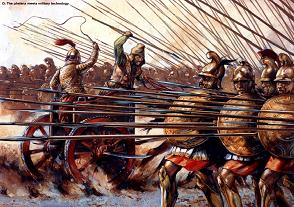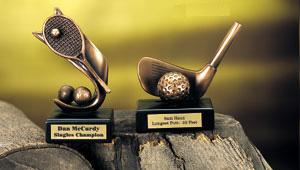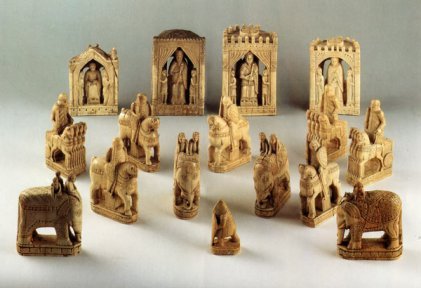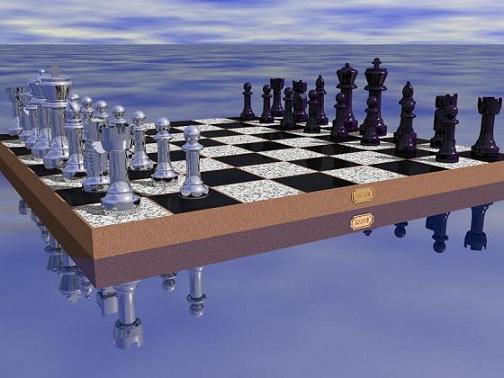What would you do if you were a retired general? At first, two generals in this situation are happy to reminisce. But soon they become bored, and start to wonder about what could be the ultimate game and competition between the two of them. The following is Bernard Suits’ writing from one of my ten favorite books of all time, and ellipses indicate where I have removed longer sections… enjoy!
———————————————————-
Ivan and Abdul … had been officers of general rank before each was retired and ‘elevated’ to the post of ambassador in the backwater capital of Rien-Ã -faire.

|
Both had established brilliant military careers in the service of homelands which had frequently been at war with one another…. So the two warriors were overjoyed at the opportunity their appointments afforded them for going over all of their old campaigns together. But after a few month, when they had reviewed all the victories and defeats from every possible angle…, they grew weary of their reminiscences and sought other diversions. |
Sport seemed an obvious pastime for a couple of shelved warriors to take up, since sport seemed to them to be a kind of substitute, or polite, kind of warfare. It soon became evident to them, however, that sports were like warfare only in the most superficial respects. Specifically, they found that sports were hedged round with the most outrageously arbitrary restrictions.
| In golf, for example, you were expected to use a golf club to get your ball out of a sand trap even when your opponent could not see what you were doing. And in tennis, you were expected to call a ball foul or fair honestly even when your opponent was not in a position to check your call. Chess was no better, since surreptitiously to alter the location of pieces on the board — obviously an effective tactic — was ruled out. |
 |
But since they could find nothing better to do to occupy their time, they continued to play these games, although — as the diplomatic colony to its delight soon became aware — with a difference. Whenever the rules could be broken without detection or retribution, they were broken. …
Things reached their fated conclusion in a climactic chess match. … The first game proceeded normally for six moves. Then Ivan made the move which was the beginning of the end. Utterly ignoring the rules governing movement of the pieces, he illegally moved his queen to a square which put Abdul in check. The fascinated audience waited breathlessly for Abdul’s response to this outrage. It was not slow in coming. He simply removed Ivan’s queen from the board and put it in his pocket. Ivan in turn was quick to respond. In a trice he had nimbly rearranged the pieces on the board so that Abdul’s king was in checkmate, crying, ‘I’ve won!’

‘Wrong, my friend,’ screamed Abdul, and gathering up all of the pieces except his king, he flung them to the floor.
‘Abdul, you can’t do that,’ said Ivan in outraged tones. ‘I won the game the moment you were in checkmate.’
‘So you say,’ responded Abdul, ‘but you were obviously mistaken, for there stands my king, quite free to move.’
Ivan had not, of course, expected such a transparent tactic to succeed with the wily Abdul. It had merely been a diversionary move so that he could, while his opponent was momentarily distracted, secure Abdul’s king to the board with the quick-drying glue he had all along held ready in his hand beneath the table. Then, of course, before you could say ‘scimitar,’ Abdul snatched a bottle of solvent from his tunic and freed his king. Ivan’s hand immediately shot out towards the king, but Abdul grabbed his wrist in time to forestall the assault. For a full minute they were locked in a frozen tableau of force and counterforce (evoking spirited applause form the audience), before they broke apart, leapt from their chair and began to circle each other warily. …
They fought all that night
Neath the pale yellow light,
And the din it was heard from afar.
Huge multitudes came,
So great was the fame
Of Abdul and Ivan Skavar.
The legend then incorrectly goes on to recount the game as ending in a tie with mutual destruction of Abdul and Ivan, followed by some sentimental reference to a tomb rising up where the blue Danube flows….
In fact, the two friends met the following afternoon at their favourite cafe. Said Ivan, ‘My friend, that was the best chess game I’ve ever played.’
‘Oh, unquestionably,’ replied Abdul.
They drank their aperitifs in companionable silence. Then Ivan spoke again.
‘Still, there is something that bothers me.’
‘Indeed,’ said Abdul, ‘Perhaps, you know, the same thing is bothering me.’
‘I shouldn’t be surprised. If you are thinking what I am thinking you will have realized that it will be impossible for us to ever play chess again.’
‘Just so. The instant of setting out the pieces for a game would be the signal for us to start a battle whose weapons had nothing whatever to do with chess, since the only moves either of us will accept are moves that really coerce, either by force or by deceit. For, since we will not abide by the rules of the game, the winner can be only he who has gained final mastery of the situation. And, of course, it’s not only that we can no longer play chess. For the same reason, we can no longer play any game, for games require that we impose artificial restraints upon ourselves in seeking victory, and we refuse to do that.’
‘Exactly,’ said Ivan. …
‘…But an awful lot of people do seem to play chess and golf, you know, without getting into a brawl.’
‘Civilians, old boy, civilians.’
‘Still, Ivan, look at all we’re missing. I sometimes wish I could play by the rules.’
‘Wishes don’t cost anything, Abdul. The question is, can you play by the rules?’
‘I suppose not.’
‘Of course not. We are what we are.’
‘Then it looks as though we’ll have to go back to reliving our past glories for the rest of our days. Maybe it’s just time to pack it in, Ivan, as a noble Roman would have done.’
‘I don’t think it has quite to come to that, my friend.’
‘You have an idea, Ivan, I can tell.’
‘A germ, Abdul, a germ. I’m going to sleep on it, however. Tomorrow at the same time?’
‘Very well. Till tomorrow.’
Next day Abdul found his friend already seated at their table at the cafe smiling broadly at the tumbler of vodka before him.
‘Tell me your idea at once, Ivan,” said Abdul, seating himself at the table.
‘At once, my friend, at once. I have thought about it all night and most of the day, and I am satisfied that the logic is absolutely compelling. There is one, and only one, game left for us to play.’
‘What game, Ivan? What logic?’
‘A fight to the finish, my friend.’
‘What! Ivan, you must be mad!’
Continue reading ““Ivan and Abdul” by Bernard Suits – Part I”
 Have you ever been around a person for whom so many things feel like a new experience? “This is the first time I’ve seen a flower that color!” Have you ever been around a person who tastes an apple pie with you at a restaurant, and says, “This is the best apple pie I’ve had in the past year!” And doesn’t that somehow feel good? Just that experience that you are with that person when she is tasting the best apple pie of the year. That’s a small example, but suppose someone says to you not only, “you made my day,” but “that’s the most wonderful thing I’ve heard all year.” Or what if you’re speaking with a colleague and he says, “Hey Senia, that’s the first time I’ve ever thought about this work situation that way!”
Have you ever been around a person for whom so many things feel like a new experience? “This is the first time I’ve seen a flower that color!” Have you ever been around a person who tastes an apple pie with you at a restaurant, and says, “This is the best apple pie I’ve had in the past year!” And doesn’t that somehow feel good? Just that experience that you are with that person when she is tasting the best apple pie of the year. That’s a small example, but suppose someone says to you not only, “you made my day,” but “that’s the most wonderful thing I’ve heard all year.” Or what if you’re speaking with a colleague and he says, “Hey Senia, that’s the first time I’ve ever thought about this work situation that way!” 





